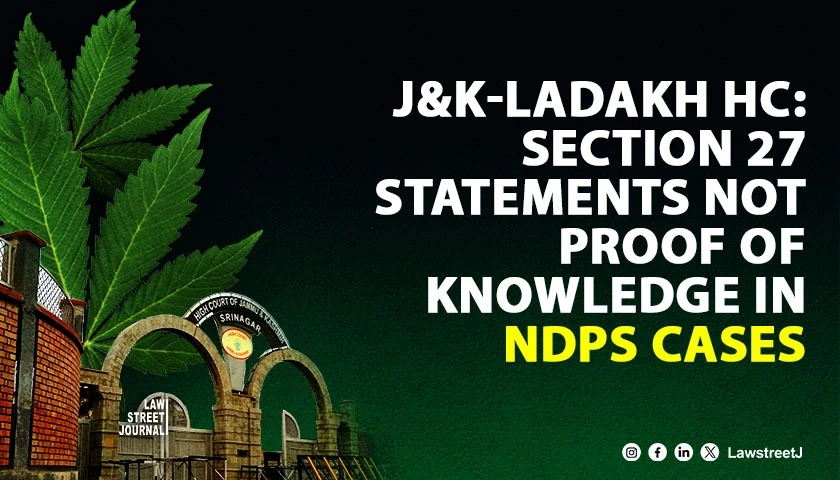Jammu: The High Court of Jammu & Kashmir and Ladakh has delivered a significant judgment, clarifying that statements under Section 27 of the Evidence Act cannot be treated as confessions and are insufficient to establish knowledge in cases of possession of contraband.
J&K-Ladakh High Court on Section 27 Evidence Act: Key Legal Interpretation
Justices Atul Sreedharan and Rajesh Sekhri made crucial observations on constitutional protections against self-incrimination and their application in narcotics cases.
The court addressed an appeal against the denial of bail in a case registered under the Narcotic Drugs and Psychotropic Substances Act and the Unlawful Activities (Prevention) Act. The appellant was accused of concealing 3 kg of heroin, allegedly given to him by his brother, which was later seized based on his disclosure.
NDPS Act & Self-Incrimination: High Court’s Landmark Ruling on Bail
Examining the legal status of statements under Section 27 of the Evidence Act, the court observed:
“The Memorandum under Section 27 of the Evidence Act, if considered in the manner canvassed by the learned counsel for the Union of India, would set to naught the constitutional protection of the right against self-incrimination as protected by Article 20(3) of the Constitution.”
The court highlighted the principle that “no man shall be compelled to inculpate himself of a crime” (nemo tenetur seipsum accusare) and emphasized that any waiver of this right must follow legal procedures.
In a significant pronouncement, the court stated:
“This Court holds that the statement of an accused under Section 27 of the Evidence Act is only relevant to the extent of recovery of an artefact connected to the crime and is not a confession in law with reference to the inculpatory part of the memorandum.”
The court underscored that mere possession does not constitute an offence unless coupled with knowledge of the nature of the possessed item and noted that, apart from the Section 27 memorandum, the prosecution had no independent evidence to establish the appellant’s knowledge of the contraband’s nature.
The court allowed the appeal and granted bail to the appellant upon furnishing a personal bond of ₹1 lakh with one surety, along with conditions, including regular appearances at the local police station.
Senior Advocates M/s N. Hariharan & Kamal Nijhawan, along with Advocates Rekha Angara, Vasundhara N, Aman Akhtar, Sana Singh, and Vinayak Gautam, appeared for the appellant. Mr. Vishal Sharma, DSGI, and Mr. Vipin Kalra, PP NIA, represented the Union of India.
Case Title: Islam Ul Haq Peer Through Nighat vs. Union of India Through National Investigation Agency, Jammu



![J&K and Ladakh HC upholds preventive detention, confirms validity beyond criminal proceedings [Read Order]](/secure/uploads/2024/09/lj_7116_WhatsApp_Image_2024-09-11_at_11.36.56_AM.webp)
![High Court of J&K and Ladakh clarifies dress code rules for Advocates, dismisses domestic violence petition [Read Order]](/secure/uploads/2024/12/lj_1748_Women_lawyers_cant_appear_before_court_with_face_covered.jpg)
![Jammu & Kashmir High Court limits scope of Judicial Review in Tender disputes [Read Judgment]](/secure/uploads/2025/01/lj_8309_0f418c46-349d-4866-907b-bcd34c9236a3.jpg)




